Anthony Vila Bouza, the former police chief of Minneapolis and a summer resident of South Wellfleet since the late 1970s, died on June 26, 2023 in Bloomington, Minn. He was 94.

“Tony Bouza is a fascinating raconteur,” said Ed Felien, publisher of the Minneapolis weekly Southside Pride, adding, “Probably the thing he’s done best is being a cop.”
Bouza was assistant chief and commander of the Bronx and later deputy chief of the New York City Transit Police before moving to Minneapolis. By many accounts, he pursued his profession with doggedness and moral clarity. He told the truth as he saw it.
While serving as borough commander in the South Bronx in 1976, Tony provided commentary for the PBS documentary The Police Tapes, in which he spoke frankly about policing a neighborhood with high levels of rage caused by poverty, unemployment, inadequate housing, drugs, and street crime.
“The fact is we are manufacturing criminals,” he said. “We are manufacturing brutality.” In a 1991 article called “Law Enforcement Technology,” he argued that “the socioeconomic causes of crime need to be eliminated in order for the police to dispense justice.” Chiefs of police must, he insisted, “speak out against the problems of racism and poverty that are destroying American cities.”
Tony was born on Oct. 4, 1928 in El Seijo, Spain, a town in Galicia. His father, Jose Antonio Bouza, was away most of the time stoking coal on ships, and he was raised by his mother, Encarnacion Vila. She fled the country with her two children in 1937, during the Spanish Civil War, to join her sister in Brooklyn Heights, N.Y.
Tony graduated from Manual Training High School in Brooklyn, and after two years of Army service, he studied at the Delehanty Institute to prepare for the police exam. He joined the force in 1953.
He later earned degrees in business administration from Baruch College and public administration from City College. He “was a tireless campaigner for the development of research in policing,” wrote Prof. Lawrence Sherman in nominating Tony for the Evidence Policing Hall of Fame at George Mason University in 2012.
Tony “set so many precedents and broke so many unspoken rules about random assignment,” Sherman wrote, “that he literally made the world safe for Chiefs of Police to move forward with evidence-based policing.”
But not without controversy. “In a paramilitary hierarchy where conflict is muffled,” reported the New York Times, “Mr. Bouza stood out by speaking his mind as a self-confessed maverick and ‘chronic malcontent.’ ” He once said, “In New York, the police code is stronger than the Mafia’s code of omertà.”
Tony and his wife, Erica, arranged to have a house built on Wellfleet’s Drummer Cove in the 1970s. They saw it for the first time after it was completed, said former Wellfleet Police Chief Richard Rosenthal. Tony was trusting, said Moe Barocas, a neighbor, and “he was a big part of Wellfleet life. He was larger than life, tall, with large hands and a booming voice. He had a special presence.”
Tony was also “a Renaissance man,” said Rosenthal. He wrote nine books, including The Police Mystique: An Insider’s Look at Cops, Crime, and the Criminal Justice System (1990).
And he was very funny. According to Evelyn and Bob Jackson, Tony’s relationship with his wife was like something out of The Taming of the Shrew. “They would insult each other,” said Evelyn, in ways that revealed their mutual love of language and of each other. The fact that the love was not always apparent to others was part of their “subterfuge,” one of their favorite words, she said.
Tony said he was “to the left of Lenin,” and Erica told people she was a Communist, said Rosenthal. At a 1983 demonstration in Minneapolis against a munitions manufacturer, Erica was arrested. As chief of police, Tony ordered coffee for those detained, Rosenthal said.
In Minneapolis, Tony was “a strict, no-nonsense chief,” wrote Felien. “He vigorously fought street crime and enforced traffic laws.” In Wellfleet, according to Barocas, “he was the best shucker of all.” He collected oysters on the flats to give to friends but wouldn’t eat them himself.
After Tony retired, he served as an expert witness in cases that involved allegations of police abuse. That work, Rosenthal said, “was very difficult, especially dealing with lawyers who looked to profit from the cases. But he was sensitive to the plight of poor African Americans.”
In his book Lessons Learned, Tony wrote that he was often asked if the press had been fair to him. “No,” he would answer. “If they were fair, they’d expose me for the incompetent fool I am. Instead, they have been generous.”
Tony is survived by his wife of 66 years, Erica Bouza; sons Dominick of Minneapolis and Tony of Santa Monica, Calif.; and four grandchildren.
There are no immediate plans for a memorial service.
